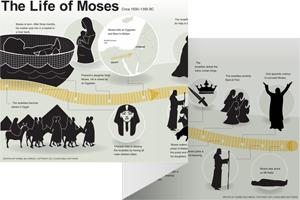5:1–23 Moses and Aaron approach Pharaoh for the first time and ask him to allow the Israelites to celebrate a festival in the wilderness. He responds negatively, refusing to let the Israelites go and requiring them to gather their own straw to make bricks. |
5:1 Moses See 2:10–11; 3:1–4; 4:1–17.
Yahweh the God of Israel See 3:14–17.
5:2 I should listen Pharaoh, who was considered by his fellow Egyptians an incarnation of the deity Horus (son of Isis and Osiris) and generational son of Ra, has no respect for the God of the Hebrews. At this first meeting with Pharaoh, Moses does not have an opportunity to use the signs God gave him (4:1–9). He will use them at their next meeting (7:9–25).
I do not know Yahweh Since Yahweh is not part of the Egyptian pantheon, Pharaoh does not consider Him worthy of reverence.
5:3 The God of the Hebrews See 3:14–17; 4:1–17, 27.
the Hebrews See Gen 14:13 and note.
5:4 forced labor Pharaoh includes Moses and Aaron with the rest of the “negligent” Israelite slaves.
5:6 that day Pharaoh quickly punishes the Israelites on account of Moses and Aaron.
foremen In Egypt’s system of forced labor, a foreman led a small “gang” of workers (slave and free) and answered to a supervisor or “taskmaster.” In the scenario described in Exod 5, the foremen are Israelites working under Egyptian taskmasters (vv. 14–16, 19).
5:7 gather straw Pharaoh does not demand that the Israelites refrain from using straw. Rather, the brick-makers now had to gather their own straw. This addition of this task would dilute their labor pool and consume time, making it impossible for them to complete the assigned number of bricks (see v. 8).
5:8 sacrifice See 3:18. Pharaoh mocks the Israelites.
5:9 not pay attention to words of deception The Egyptians considered any reasoned excuse from the Israelites a lie.
5:21 you have caused our fragrance to stink An idiom that refers to being made contemptible. “You” is plural, indicating that the Israelites blame Moses and Aaron for their hardship.
5:22 Moses returned to Yahweh Moses retreats to speak with God and vent his frustration. The Hebrew text indicates a subtle shift of blame. The Israelite foremen blamed Moses and Aaron for their troubles (v. 21, “you” is plural). Here, Moses blames Yahweh.
5:23 he has brought trouble The Hebrew verb refers to calamity, suffering, or harm (Num 20:15; 1 Kgs 17:20; Prov 11:15).
you have certainly not delivered your people Moses likely expected immediate success. His disappointment recalls his initial reluctance to obey God’s call (Exod 4:1–17).

|
About Faithlife Study BibleFaithlife Study Bible (FSB) is your guide to the ancient world of the Old and New Testaments, with study notes and articles that draw from a wide range of academic research. FSB helps you learn how to think about interpretation methods and issues so that you can gain a deeper understanding of the text. |
| Copyright |
Copyright 2012 Logos Bible Software. |
| Support Info | fsb |
 Loading…
Loading…

